2013高考英语 经典陷阱题大串讲 形容词与副词类
典型高考英语陷阱题详解-形容词

典型高考英语陷阱题详解•形容词与副词1. We don’t care if a hunting dog smells _________, but we really don’t want him to smell _________.A. well, wellB. bad, badC. well, badlyD. badly, bad【陷阱】容易误选B,认为两个smell 均为连系动词,后接形容词作表语。
【分析】这是1995年的一道上海高考题,最佳答案为D。
句中的第一个smell 为实义动词,意为“闻气味”、“嗅觉”,smell badly 意为“嗅觉差”;第二个smell 为连系动词,意为“闻起来(有某种气味)”,smell bad 意为“闻起来气味难闻”。
全句意为“我们并不介意一条猎狗的嗅觉不好,但我们的确不希望它的气味难闻”。
2. “_________ do you think of your English teacher?”“Oh, he is an _________ man.”A. What, interestingB. What, interestedC. How, interestingD. How, interested【陷阱】容易误选D,认为第一空应填how,表示how“如何”;第二空应填interested,因为有的书上说–ing 形容词主要说明事物,-ed 形容词主要说明人。
【分析】其实最佳答案应是A。
英语中表示汉语的“你觉得……如何?”时,可用How do you like ...? 或What do you think of ...? 注意两者搭配不同,即like 与how 搭配,think of 与what 搭配。
另一方面,有的书认为:-ing 形容词说明事,-ed 形容词说明人。
此说法在很多情况下是可行的,但表述欠严谨。
严谨的表述应该是:表示使(别)人感到如何), 用-ing形容词;表示人自己本身感到如何,用-ed 形容词。
高考英语一轮复习语法点专题讲解形容词和副词
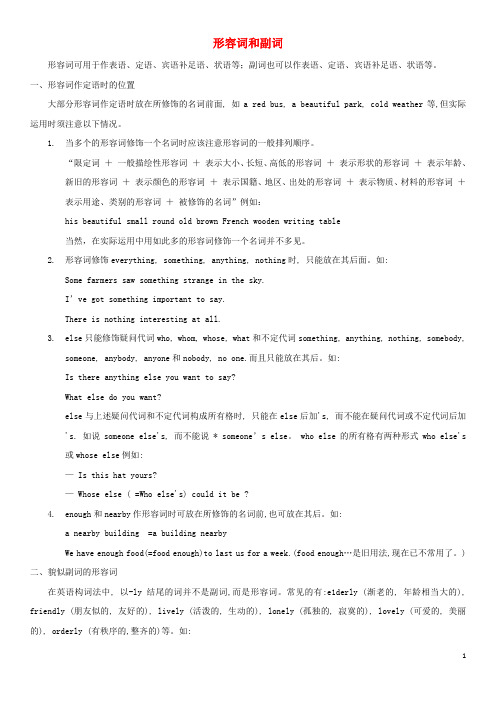
形容词和副词形容词可用于作表语、定语、宾语补足语、状语等;副词也可以作表语、定语、宾语补足语、状语等。
一、形容词作定语时的位置大部分形容词作定语时放在所修饰的名词前面, 如a red bus, a beautiful park, cold weather等,但实际运用时须注意以下情况。
1.当多个的形容词修饰一个名词时应该注意形容词的一般排列顺序。
“限定词+一般描绘性形容词+表示大小、长短、高低的形容词+表示形状的形容词+表示年龄、新旧的形容词+表示颜色的形容词+表示国籍、地区、出处的形容词+表示物质、材料的形容词+表示用途、类别的形容词+被修饰的名词”例如:his beautiful small round old brown French wooden writing table当然,在实际运用中用如此多的形容词修饰一个名词并不多见。
2.形容词修饰everything, something, anything, nothing时, 只能放在其后面。
如:Some farmers saw something strange in the sky.I’ve got something important to say.There is nothing interesting at all.3.else只能修饰疑问代词who, whom, whose, what和不定代词something, anything, nothing, somebody,someone, anybody, anyone和nobody, no one.而且只能放在其后。
如:Is there anything else you want to say?What else do you want?else与上述疑问代词和不定代词构成所有格时, 只能在else后加's, 而不能在疑问代词或不定代词后加's. 如说someone else's, 而不能说* someone’s else。
三年高考(2013-2015)英语试题分项精析版——专题03 形容词和副词(解析版) .doc
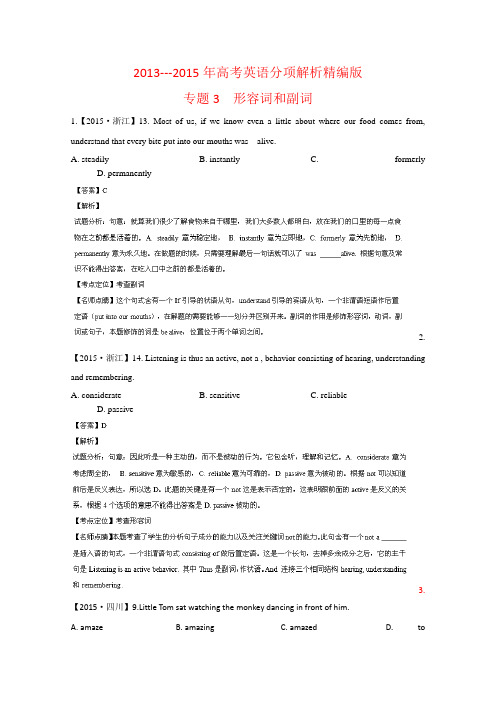
2013---2015年高考英语分项解析精编版专题3 形容词和副词1.【2015·浙江】13. Most of us, if we know even a little about where our food comes from, understand that every bite put into our mouths was alive.A. steadilyB. instantlyC. formerlyD. permanently2.【2015·浙江】14. Listening is thus an active, not a , behavior consisting of hearing, understanding and remembering.A. considerateB. sensitiveC. reliableD. passive3.【2015·四川】9.Little Tom sat watching the monkey dancing in front of him.A. amazeB. amazingC. amazedD. toamaze4.【2015·四川】7.Andy is content with the toy. It is he has ever got.A. a betterB. the betterC. a bestD. the best5.【2015·福建】23.It was________of Michael to inform us of his delay in case we got worried.A. carelessB. considerateC. patientD. generous【答案】B【解析】试题分析:考查形容词辨析A.careless不小心的;B.considerate体贴的;C.Patient有耐心的;D.generous慷慨的。
高考英语短文改错考点类析2-4-形容词和副词
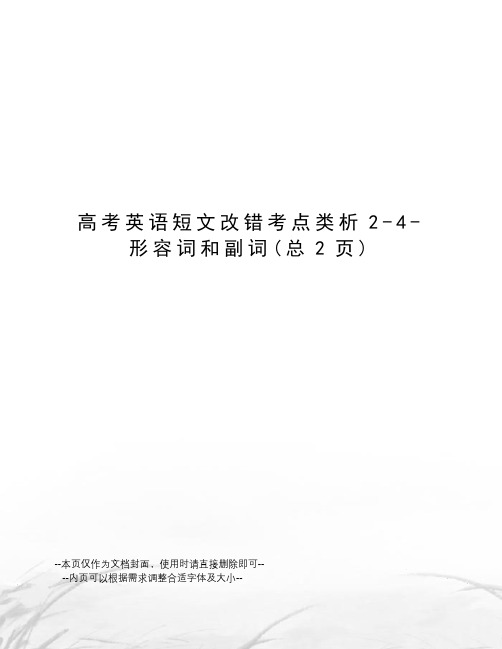
高考英语短文改错考点类析2-4-形容词和副词(总2页)--本页仅作为文档封面,使用时请直接删除即可----内页可以根据需求调整合适字体及大小--高考英语短文改错考点类析:形容词与副词一、考点规律分析短文改错对形容词与副词的考查主要涉及:形容词和副词比较等级的误用(尤其是在本身已是比较级的词前误加more)、形容词与副词的混用(如修饰动词时误用形容词或修饰名词时误用副词)等,另外,用作表语时该用形容词的却误用了名词、简短副词(如 in, down 等)的误加与漏用、涉及形容词搭配的as…as 结构、how 与 what 的混用等也是常考的考点。
二、真题单句归纳(1) After an hour or so we began to feel very frightening.(2) Charles said, “As soon as I see a realy tall building, I want to climb it.(3) Last Sunday, police cars hurry to the taller building in New York.(4) As a result, people in the modern world generally live much more longer than people in the past.(5) Therefore, there are still some countries where people have shorter lives.(6) People in industrial countries can expect to live for twice so long as people who lived a few hundred years ago.(7) In some places you may borrow many books as you want.(8) I told Mother, Father, Sister and all my friends here that a great time I had.(9) I never knew a ride down a river could be so much exciting.(10) I’m sure we’ll have a wonderfully time together.(11) First, let me tell you something more about myself.(12) I used to play ping-pong a lot in my spare time, but now I am interestingin football.(13) Also, the sport teaches us the important of obedience.(14) Unfortunate, there are too many people in my family.(15) I think I liked those classes because I felt that they helped me understand what the world works.(16) After learning the basics of the subject, nothing else seemed very practically to me.(17) Whenever I see them I will often think of my English teacher.(18) What things are in other homes, I wonder.(19) For instance, one night he played strong and loudly music till fouro’clock in the morning.(20) But he is difference now.(21) The time passes quickly. Evening came down.(22) …alth ough radios can be very noise.(23) …all planned and written by grown-ups to make children want things that they don’t real need.(24) But one of the best players in our team told me just then that he wouldn’t play basketball any more.(25) But one of th e best players in our team told me just now that he wouldn’t play basketball once more.(26) I would describe myself as shy and quietly.(27) Finding information on the Net is easily.(28) Yes, a concert can be very excited.(30) Nowadays millions of people of all age take pleasure in a hobby which is both interested and fun.(31) She called 119 immediate.(32) However, we seldom felt lonely or helplessly.三、模拟单句演练(1) I’ll try to be more carefully next time.(2) China is much more bigger than the United States.(3) There are few boys than girls in our class.(4) He says that skiing is much exciting than skating.(5) The more money you make, the most you spend.(6) He found someone was following her, so she felt frightening.(7) It was real very dangerous. You might have injured yourself.(8) In fact, we finished the work without any difficult.(9) Look at the asleep boy. How lovely!(10) The fish tastes well; why not have a try?(11) Last week was very rain. I didn’t go out the whole week.(12) The sun rises in the east and sets down in the west.(13) I promise to return back before 10.(14) The book contains much use information. It’s well worth reading.(15) This is quite far the mostly expensive bicycle in the shop.(16) The workers warm welcomed us at their offices.(17) Oh, it’s simply wonderfully to see you here!(18) She is in more health now than she was last year.。
高考英语 经典陷阱题大串讲 形容词与副词类

2013高考英语经典圈套题大串讲·描述词与副词类1.We don’t care if a hunting dog smells _________, but we really don’t want him to smell _________.A. well, wellB. bad, badC. well, badlyD. badly, bad【圈套】容易误选B,认为两个smell 均为连系动词,后接描述词作表语。
【分析】这是1995年的一道上海高考题,最好答案为D。
句中的第一个 smell 为实义动词,意为“闻气味”、“嗅觉”,sm ell badly 意为“嗅觉差”;第二个 smell 为连系动词,意为“闻起来(有某种气味)”,smell bad 意为“闻起来气味难闻”。
全句意为“我们并不介意一条猎狗的嗅觉不好,但我们的确不希望它的气味难闻”。
2.“_________ do you think of your English teacher?”“Oh, he is an _______ man.”A. What, interestingB. What, interestedC. How, interestingD. How, interested【圈套】容易误选D,认为第一空应填 how,表示“如何”;第二空应填 interested,由于有的书上说–ing 描述词次要阐明事物,-ed 描述词次要阐明人。
【分析】其实最好答案应是A。
英语中表示汉语的“你觉得……如何?”时,可用How do you like ...? 或 What do you think of ...? 留意两者搭配不同,即 like 与 how 搭配,think of 与 what 搭配。
另一方面,有的书认为:-ing描述词阐明事,-ed 描述词阐明人。
此说法在很多情况下是可行的,但表述欠严谨。
严谨的表述该当是:表示使(别)人感到如何, 用-ing描述词;表示人本人本身感到如何,用-ed描述词。
【高考】英语陷阱题总结归纳——形容词与副词(附详解)

【高考】英语陷阱题总结归纳——形容词与副词(附详解)---炳辉书店---高考英语陷阱题总结归纳——形容词与副词◆典型陷阱题分析◆1.We don’t care if a hunting dog smells _____, but we really don’t want him to smell ____.A. well, wellB. bad, badC. well, badlyD. badly, bad【陷阱】容易误选B,认为两个smell 均为连系动词,后接形容词作表语。
【分析】这是1995年的一道上海高考题,最佳答案为D。
句中的第一个smell 为实义动词,意为“闻气味”、“嗅觉”,smell badly 意为“嗅觉差”;第二个smell 为连系动词,意为“闻起来(有某种气味)”,smell bad 意为“闻起来气味难闻”。
全句意为“我们并不介意一条猎狗的嗅觉不好,但我们的确不希望它的气味难闻”。
2.“_____ do you think of your English teacher?” “Oh, he is an _____ man.”A. What, interestingB. What, interestedC. How, interestingD. How, interested【陷阱】容易误选D,认为第一空应填how,表示“如何”;第二空应填interested,因为有的书上说–ing 形容词主要说明事物,-ed 形容词主要说明人。
【分析】其实最佳答案应是A。
英语中表示汉语的“你觉得……如何?”时,可用How do you like ...? 或What do you think of ...? 注意两者搭配不同,即like 与how 搭配,think of 与what 搭配。
另一方面,有的书认为:-ing形容词说明事,-ed形容词说明人。
此说法在很多情况下是可行的,但表述欠严谨。
英语陷阱题6——形容词与副词

英语陷阱题——形容词与副词【例题】1.We don’t care if a hunting dog smells _____, but we really don’t want him to smell ____.A. well, wellB. bad, badC. well, badlyD. badly, bad <陷阱>容易误选B,认为两个smell 均为连系动词,后接形容词作表语。
<分析>这是1995年的一道上海高考题,最佳答案为D。
句中的第一个smell 为实义动词,意为“闻气味”、“嗅觉”,smell badly 意为“嗅觉差”;第二个smell 为连系动词,意为“闻起来(有某种气味)”,smell bad 意为“闻起来气味难闻”。
全句意为“我们并不介意一条猎狗的嗅觉不好,但我们的确不希望它的气味难闻”。
2.“_____ do you think of your English teacher?” “Oh, he is an _____ man.”A. What, interestingB. What, interestedC. How, interestingD. How, interested<陷阱>容易误选D,认为第一空应填how,表示“如何”;第二空应填interested,因为有的书上说–ing 形容词主要说明事物,-ed 形容词主要说明人。
<分析>其实最佳答案应是A。
英语中表示汉语的“你觉得……如何?”时,可用How do you like ...? 或What do you think of ...? 注意两者搭配不同,即like 与how 搭配,think of 与what 搭配。
另一方面,有的书认为:-ing形容词说明事,-ed形容词说明人。
此说法在很多情况下是可行的,但表述欠严谨。
严谨的表述应该是:表示使(别)人感到如何, 用-ing形容词;表示人自己本身感到如何,用-ed形容词。
易错点22 语法填空:有提示词之形容词和副词(3大陷阱)-备战2024年高考英语考试易错题(解析版

易错点22 有提示词之形容词和副词目录01 易错陷阱(3大陷阱)02 举一反三【易错点提醒一】词性、词形转换类易混易错点【易错点提醒二】级别类易混易错点【易错点提醒三】用法类易混易错点03 易错题通关易错陷阱1:词性、词形转换类易混易错点。
【分析】形容词一般在词尾加-ly变为副词,但也有不规则变化形式需牢记。
易错陷阱2:级别类易混易错点。
【分析】易错陷阱3:用法类易混易错点。
【分析】形容词作定语用于修饰名词,常谓语名词之前;分词形容词作表语时,-ing类常修饰事物,如:exciting, surprising, moving, puzzling等;-ed类副词形容词常修饰人或人的表情,如:excited, surprised, moved, puzzled等。
形容词作状语,修饰主语,与主语构成逻辑上的主系表关系。
副词作状语,修饰动词、形容词、副词和句子。
【易错点提醒一】词性转换类易混易错点【例1】(广东省深圳市红岭中学2023-2024学年高三统考试题)It is an ancient _________ (architecture) complex with a history of more than 600 years. In the Ming and Qing Dynasties, twenty-four emperors lived here ruling China for nearly 500 years.【答案】architectural【解析】考查形容词。
句意:它是一个有600多年历史的古代建筑群。
分析句子可知,此处应为形容词,作定语修饰名词“complex”,表示“建筑的”。
故填architectural。
【变式1】(广东省佛山市南海区2023-2024学年高三测试题)“Hospitable Shandong” has become an __ (influence) tourism brand(品牌).【答案】influential【解析】考查形容词。
2013高考英语 经典陷阱题大串讲 it用法

1 2013高考英语经典陷阱题大串讲·
it用法 1. Everyone knows that _________ is dangerous to play with fire, but ______
___ is difficult is to prevent children from playing with fire. A. it, it B. what, what C. it, what D. what, it 【陷阱】很容易误选B,认为两空均考查形式主语。 【分析】最佳答案是D,第一空填形式主语真正的主语是其后的不定式 to play with fire。第二空填 what,what is difficult 是主语从句,注意 what is difficult 后的谓语动词 is。请做以下类似试题: (1)
I haven’t got any pens, and I want to borrow one. 我没有钢笔,我想借一支。(one = a pen)
I have two pens, and I can lend one to you. 我有两本支钢笔,我可以借一支。(one = a pen) I have a pen, and I can lend it to you. 我有一本钢笔,我可以把它借给你。(it = the pen) 在上面一题中,one 相当于 one 相当于 a repair shop。请做下面一题(答案选A): There is only one English-Chinese dictionary in that book-shop. I wonder if you still want to buy _________. A. it B. one C. another D. any 5. Will you see to _____ that my children are taken good care of while I am away? A. it B. me C. yourself D. them 【陷阱】几个干扰项均有可能误选。 【分析】最佳答案是A。it 为形式宾语,真正的宾语是空格后that引导的宾语从句。see to 意为“负责”、“注意”,其中的 to 为介词,不宜直接跟that引导的宾语从句,遇此情况可借助代词 it。请做下面两题,答案也是选 it: (1) I’ll see to _________ that all these letters will be sent to the post before twelve. A. it B. me C. which D. them (2)
形容词和副词陷阱题

形容词与副词经典陷阱◆陷阱题分析◆1. We don’t care if a hunting dog smells_____, but we really don’t want him to smell ____.A. well, wellB. bad, badC. well, badlyD. badly, bad2. “Our team is _____ to win the match.” “Really? But I don’t think so.”A. EasyB. difficultC. PossibleD. sure3. Mary is very clever and _____ worth teaching, but her brother is not. Look, he is now _____ asleep in class.A. very, veryB. much, veryC. well, veryD. well, fast4. “Could I take your order now?” “Yes.One _____ tea and two _____ coffees.”A. black, whiteB. red, whiteC. black, greenD.red,black5. A ______ road goes ______ from one place to another.A. straight, straightB. straightly, straightlyC. straight, straightlyD. straightly, straight6. How beautifully she sings! I have never heard _____ voice.A. a betterB. a bestC. the betterD. the best7. You are _____ careful than your brother. You two can’t do the work that needs care and skill.A. not moreB. no moreC. not lessD. no less8. “Oh, how fat he is!” “But I think he is ____ than fat.”A. ShortB. shorterC. more shortD. shortest◆陷阱题训练◆1. It was _____ opportunity to miss.A. too good anB. a too goodC. too a goodD. too good2. I don’t like it at all. It can’t be _____.A. BetterB. WorseC. bestD. worst3. There was nothing special about this film — it was only ______.A. ParticularB. AverageC. interestingD. strange4. She looks very _____ b ut I can’t remember her name.A. SimilarB. FamiliarC. friendlyD. strange5. He said he would return the money, and I was ______.A. fool enough to believe himB. enough fool to believe himC. fool enough believing himD. enough fool believing him6. “This book is ______ more useful for us students.” “Yes, but it is _______ too difficult.”A. quite, quiteB. much, ratherC. rather, quiteD. quite, much7. The children all looked _____ at the broken model plane and felt quite _____.A. sad, sadB. sadly, sadlyC. sad, sadlyD. sadly, sad8. The child dreamed that he had once lived in a _______ house in the forest.A. wooden pretty littleB. little pretty woodenC. pretty little woodenD. wooden little pretty9. He wanted to read more, so he asked his friends if there was _______ to read.A. something easy enoughB. something enough easyC. enough easy somethingD. easy enough something10. The doctor assured the patient that there was ______ with her, but she could not help worrying.A. seriously wrong nothingB. nothing serious wrongC. nothing seriously wrongD. serious nothing wrong11. —How is your father?—He’s fine. He’s______ to play tennis every Sunday.A. enough active stillB. enough still activeC. still active enoughD. still enough active12. —Did you wash your new suit in hot water?—Of course not. I am not ______ foolish.A. VeryB. ThatC. very muchD. too13.—Which team is _______ to win the game?—I don’t know, but I’ve found _______ for ours to win.A. probable; it unlikelyB. likely; it possibleC. possible; it possibleD. likely; it possibly14. He didn’t understand the _______ question, so there was a ______ expression on his face.A. puzzling; puzzledB. puzzling; puzzlingC. puzzled; puzzledD. puzzled; puzzling15. She can speak _______ in front of Mack, but she can’t eat ______ in his restaurant.A. free, freeB. free, freelyC. freely, freeD. freely, freely16. It was raining heavily. Little Mary felt cold, so she stood ____ to her mother.A. CloseB. CloselyC. closedD. closing17. Fred is second to none in maths in our class, but believe it or not, he _______ passed the last exam.A. EasilyB. HardlyC. actuallyD. successfully18. In my apartment there are two rooms, _____ is used as a living room.A. larger oneB. the larger of whichC. the largest oneD. the largest of which19. “Are you satisfied with his answer?” “Not at all. It couldn’t have been ____.”A. BetterB. WorseC. moreD. less20. I’m _____ at sums than Jean, but better at history.A. MoreB. LessC. worseD. cleverer21. We couldn’t have picked ______ day for the picnic — it rained nonstop.A. a worseB. a worstC. the worseD. the worst22. I know this is not quite the right word, but I can’t be bothered to think of _____.A. a betterB. a bestC. the betterD. the good23. — Did you enjoy yourself at the party?—Sorry to say I didn’t. It was ______ a meeting than a party.A. more likeB. quite likeC. less likeD. more or less24. When they arrived at the school it was raining _______ harder.A. MoreB. QuiteC. very D even25. With the development of the Internet, _______ communication is done by regular mail.A. LessB. MoreC. littleD. few26. —If you don’t like the red coat, take the blue one.—OK, but do you have ______ size in blue? This one’s a bit tight for me.A. a bigB. a biggerC. the bigD. the bigger27. If there were no examinations, we should have ______ at school.A. the happiest timeB. a more happier timeC. much happiest timeD. a much happier time28. This dress is prettier, but it costs ______ that one.A. twice more thanB. twice as much asC. as much twice asD. twice so much as【答案与解析】1. 选A,too …to …结构除用于“too + 形容词或副词+ to do sth”外,也可用于“too + 形容词+ a / an + 单数可数名词+ to do sth”。
(江苏专用)2013高三英语二轮复习 高频考点(高频 规律 技巧)B2 形容词与副词课件

[考查倍数表达法。]
③(上海卷)With the help of German experts, the factory
produced ________cars in 1993 as the year before. A.as twice many B.as many as twice
C.as twice as many
分析句子成分,确定该词在该句中是系动词还是行为动 词。修饰行为动词用副词,系动词后用形容词。句意:猎 人不怕猎狗嗅觉不好而怕其身上有味。学生弄不清楚句意 而误选A、C。答案为B。
After the long journey, the three of them went back home, ________.
[考查倍数表示法。]
①(江西卷)It is reported that the United States uses ________ energy as the whole of Europe. A.as twice B.twice much
C.twice much as
答案 D B。故D正确。]
年份 2008 2009 2010 2011 2012
趋势解读
2013年高考对形容词、副词的考查热点将仍然 集中在对形容词、副词的辨析上,同时继续加 强对形容词、副词比较等级的考查,但对此点
的考查具有“淡化语法,注重深层语义”的特
易错点22 语法填空:有提示词之形容词和副词(3大陷阱)-备战2024年高考英语考试易错题(原卷版

易错点22有提示词之形容词和副词目录01易错陷阱(3大陷阱)02举一反三【易错点提醒一】词性、词形转换类易混易错点【易错点提醒二】级别类易混易错点【易错点提醒三】用法类易混易错点03易错题通关易错陷阱1:词性、词形转换类易混易错点。
【分析】形容词一般在词尾加-ly变为副词,但也有不规则变化形式需牢记。
易错陷阱2:级别类易混易错点。
【分析】易错陷阱3:用法类易混易错点。
【分析】形容词作定语用于修饰名词,常谓语名词之前;分词形容词作表语时,-ing类常修饰事物,如:exciting,surprising,moving,puzzling等;-ed类副词形容词常修饰人或人的表情,如:excited,surprised,moved,puzzled等。
形容词作状语,修饰主语,与主语构成逻辑上的主系表关系。
副词作状语,修饰动词、形容词、副词和句子。
【易错点提醒一】词性转换类易混易错点【例1】(广东省深圳市红岭中学2023-2024学年高三统考试题)It is an ancient_________ (architecture)complex with a history of more than600years.In the Ming and Qing Dynasties, twenty-four emperors lived here ruling China for nearly500years.【变式1】(广东省佛山市南海区2023-2024学年高三测试题)“Hospitable Shandong”has becomean__(influence)tourism brand(品牌).【变式3】(广东省河源市2023-2024学年高三开学联考)China is one of the world’s most biologically__(diversity)countries.【易错点提醒二】级别类易混易错点【例2】(广东省湛江市第一中学2023-2024学年高三试题)It listed the two-part Vietnamese bridge as the world’s____(long),at632metres.【变式1】(广东省六校2023-2024学年高三第一次联考试题)In fact,the story is much_______ (complex),according to findings that Dr.Wang,now an ecologist at Fudan University in Shanghai, published last month in Biological Conservation.【易错点提醒三】用法类易混易错点【例3】(广东省广州市2023-2024学年高三训练试卷)It has appealed to audiences of all ages, who_____(enthusiastic)recite poetry alongside the characters on screen,taking them on a fantastic journey.【变式1】(广东省广东省四校联考2023-2024学年高三试题)Meanwhile,they found that cancer rates were just as high in excessive consumers of artificial sweetener and excessive sugar intake may【变式2】广东省东莞实验中学高三下学期开学“收心”试题)Besides,people around the globe can have access_____to Confucius ideas in Confucius Institutes and Chinese Culture Centers abroad (free).2.(湖南省长沙市南雅中学2023-2024学年高三试题)Huguosi Street was one of Beijing’s _________(busy)commercial roads in the olden days.5.(湖南天壹名校联盟2023-2024学年高三大联考试题)The event’s highlight was the performances by members from the Malta School of Wushu-Longgui,who showcased(amaze)dragon dances and martial arts,attracting many audiences.6.(湖南省常德市临澧一中2023-2024学年高三试题)At that time,most people in the village lived with poverty,which means they could simply afford food and basic clothing,but seldom purchasethings like bicycles or televisions.So many villagers left their hometown(hope).7.(湖北省武汉市硚口区2023-2024学年高三质检)However,in a garden in Geling village in Metog county in the Tibet autonomous region,the morning air is filled with the sweet aroma of ________(fresh)picked tea.9.(湖北省孝感市重点高中协作体2023-2024学年高三试题)Although the young fans of hanfu generally agree____is no need to strictly follow the ancient rules,their opinions differ significantly.10.(湖北省孝感市重点高中协作体2023-2024学年高三试题)But one thing is for sure,young people have become(increasing)interested in activities to promote and display the traditional Chinese culture.11.(湖北省黄冈市2023-2024学年高三调研试题)No wonder Hangzhou is expanding (annual)by500,000to600,000people.12.(湖北省腾云联盟2023-2024年高三联考试题)Group members would(definite)make every effort to assist one another and solve problems.。
(整理版高中英语)高考英语经典陷阱题大串讲·连词

高考英语经典陷阱题大串讲·连词1.I’m sorry, _________ I won’t be able to come tonight.A. forB. andC. butD. then【陷阱】容易误选A,因为空格后的句子是用以说明I’m sorry 的原因的,所以便想当然地认为要选for来表示原因。
【分析】事实上,I’m sorry 后习惯上不接表示原因的连词 for,而接表示转折的连词 but〔也可省略 but〕,用以委婉地提出一个使对方不快的事实。
又如:Oh, sorry, but she’s out. 哦,不好意思,她出去了。
I’m sorry, but I have to disa gree. 对不起,我不敢苟同。
I’m sorry, but I have already had another appointment. 对不起,我已经有约会了。
注:I’m sorry 后虽然不能接表原因的连词for,但却可接介词 for。
如:I’m sorry for shouting at you. 对不起冲你嚷嚷了。
I am sorry for what I said to you. 我懊悔不该对你讲那些话。
2. The point is not who said the words, _________ they are true or not.A. but whetherB. and whetherC. but howD. and how【陷阱】几个干扰项均有可能误选。
【分析】最正确答案为A。
此题涉及两个搭配:一是not … but …〔不是……而是……〕,二是whether … or not (是否)。
请看类例:He was not an actor, who often appeared on stage, _______ a writer, writing stories.A. butB. andC. thenD. so答案选A,主要考查not … but … 结构。
2013年高考英语试题分类解析 形容词与副词

形容词与副词1.【2013辽宁33】This is by far ______ movie that I have ever seen.A. an inspiringB. a much inspiringC. the most inspiringD. the more inspiring【答案】C【解析】考查形容词比较等级。
句意:这是迄今为止我所看过的最令人鼓舞的电影。
句中信息by far及I have ever seen空格处使用最高级。
2.【2013辽宁27】Everything seemed to be going ______ for the first two days after I moved to New York.A. vividlyB. generallyC. frequentlyD. smoothly【答案】D【解析】考查副词辨析。
smoothly顺利地。
vividly生动逼真地;generally一般地,通常;frequently经常。
句意:去纽约后的前两天看起来一切进展顺利。
3.【2013福建31】Those poor and needy teenagers were excited to find a shop at the corner where they could buy _______ priced bike.A. competitivelyB. recentlyC. reasonablyD. affordably【答案】D【解析】考查副词辨析。
affordably不太昂贵地。
competitively具竞争性地,recently最近,reasonably合理地,理性地。
题中信息Those poor and needy teenagers(那些贫穷的青少年),那个商店定价不太昂贵。
句意:那些贫穷的青少年很兴奋在拐角处能够找到一个商店,在那里他们有能力购买自行车。
语法填空:有提示词之形容词和副词(3大陷阱)-备战2024年高考英语考试易错题(解析版)

易错点22有提示词之形容词和副词目录01易错陷阱(3大陷阱)02举一反三【易错点提醒一】词性、词形转换类易混易错点【易错点提醒二】级别类易混易错点【易错点提醒三】用法类易混易错点03易错题通关易错陷阱1:词性、词形转换类易混易错点。
【分析】形容词一般在词尾加-ly变为副词,但也有不规则变化形式需牢记。
易错陷阱2:级别类易混易错点。
【分析】易错陷阱3:用法类易混易错点。
【分析】形容词作定语用于修饰名词,常谓语名词之前;分词形容词作表语时,-ing 类常修饰事物,如:exciting,surprising,moving,puzzling 等;-ed 类副词形容词常修饰人或人的表情,如:excited,surprised,moved,puzzled 等。
形容词作状语,修饰主语,与主语构成逻辑上的主系表关系。
副词作状语,修饰动词、形容词、副词和句子。
【易错点提醒一】词性转换类易混易错点【例1】(广东省深圳市红岭中学2023-2024学年高三统考试题)It is an ancient _________(architecture)complex with a history of more than 600years.In the Ming and Qing Dynasties,twenty-four emperors lived here ruling China for nearly 500years.【答案】architectural【解析】考查形容词。
句意:它是一个有600多年历史的古代建筑群。
分析句子可知,此处应为形容词,作定语修饰名词“complex”,表示“建筑的”。
故填architectural。
【变式1】(广东省佛山市南海区2023-2024学年高三测试题)“Hospitable Shandong”has become an__(influence)tourism brand(品牌).【答案】influential【解析】考查形容词。
高考英语陷阱题总结归纳--形容词与副词

B.free, freely
C.freely, free
D.freely, freely
详细信息
17. 难度:简单
Fred is second to none in maths in our class, but believe it or not, he _______ passed the last exam.
A.very, very
B.much, very
C.well, very
D.well, fast
详细信息
3. 难度:简单
Entering the house we found him lying on the bed with his mouth _______ and eyes _______.
A.open, close
A.very
B.that
C.very much
D.too
详细信息
15. 难度:简单
—Which team is _______ to win the game?
—I don’t know, but I’ve found _______ for ours to win.
A.probable; it unlikely
高考英语陷阱题总结归纳--形容词与副词
一、单项填空
详细信息
1. 难度:简单
I think he is _____ to tell us the secret, but I’m not sure.
A.possible
B.likely
C.impossible
D.certain
详细信息
2. 难度:简单
Mary is very clever and _____ worth teaching, but her brother is not. Look, he is now _____ asleep in class.
2013高考英语试题汇编:形容词和副词
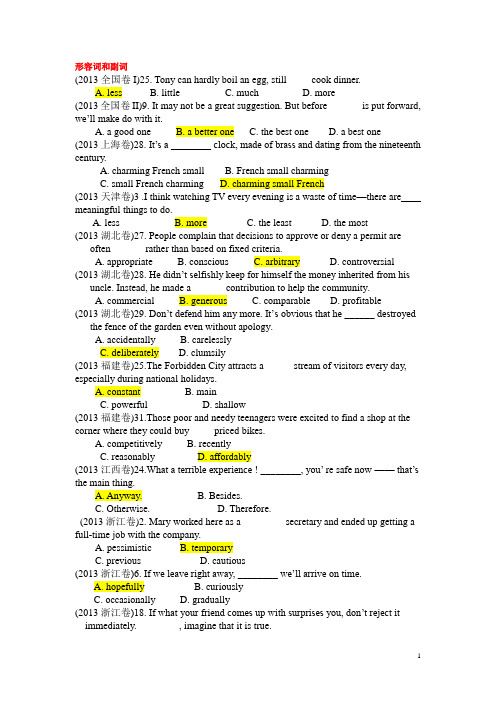
形容词和副词(2013全国卷I)25. Tony can hardly boil an egg, still ____ cook dinner.A. lessB. littleC. muchD. more(2013全国卷II)9. It may not be a great suggestion. But before ______ is put forward, we’ll make do with it.A. a good oneB. a better oneC. the best oneD. a best one(2013上海卷)28. It’s a ________ clock, made of brass and dating from the nineteenth century.A. charming French smallB. French small charmingC. small French charmingD. charming small French(2013天津卷)3 .I think watching TV every evening is a waste of time—there are meaningful things to do.A. lessB. moreC. the leastD. the most(2013湖北卷)27. People complain that decisions to approve or deny a permit are often ______ rather than based on fixed criteria.A. appropriateB. consciousC. arbitraryD. controversial (2013湖北卷)28. He didn’t selfishly keep for himself the money inherited from his uncle. Instead, he made a ______ contribution to help the community.A. commercialB. generousC. comparableD. profitable(2013湖北卷)29. Don’t defend him any more. It’s obvious that he ______ destroyed the fence of the garden even without apology.A. accidentallyB. carelesslyC. deliberatelyD. clumsily(2013福建卷)25.The Forbidden City attracts a _____ stream of visitors every day, especially during national holidays.A. constantB. mainC. powerfulD. shallow(2013福建卷)31.Those poor and needy teenagers were excited to find a shop at the corner where they could buy ____ priced bikes.A. competitivelyB. recentlyC. reasonablyD. affordably(2013江西卷)24.What a terrible experience ! ________, you’ re safe now ——that’s the main thing.A. Anyway.B. Besides.C. Otherwise.D. Therefore.(2013浙江卷)2. Mary worked here as a ________ secretary and ended up getting a full-time job with the company.A. pessimisticB. temporaryC. previousD. cautious(2013浙江卷)6. If we leave right away, ________ we’ll arrive on time.A. hopefullyB. curiouslyC. occasionallyD. gradually(2013浙江卷)18. If what your friend comes up with surprises you, don’t reject it immediately. ________, imagine that it is true.A. ThusB. BesidesC. RatherD. Otherwise(2013辽宁卷)27. Everything seemed to be going __________for the first two days after I moved to New York.A. vividlyB. generallyC. frequentlyD. smoothly(2013辽宁卷)33. This is by far _______ movie that I have ever seen.A. an inspiringB. a much inspiringC. the most inspiringD. the more inspiring。
【优化指导】2013高考英语总复习语法突破第3讲形容词和副词感悟高考北师大版
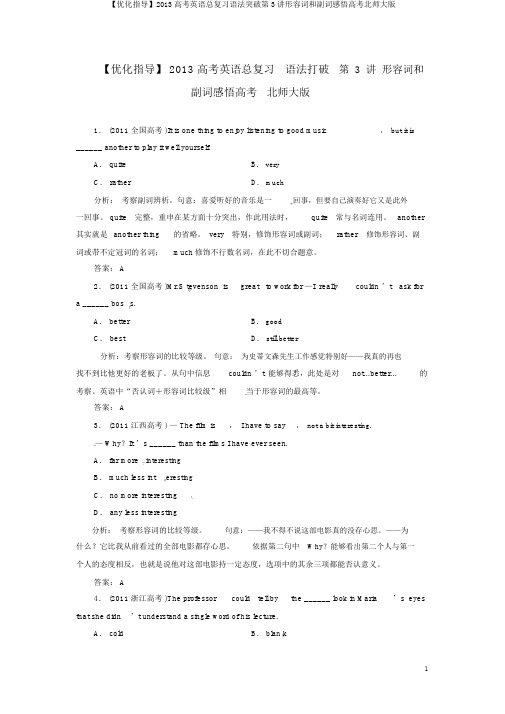
【优化指导】 2013 高考英语总复习语法打破第3讲形容词和副词感悟高考北师大版1. (2011 全国高考 )It is one thing to enjoy listening to good music,but it is______ another to play it well yourself.A. quite B. veryC. rather D. much分析:考察副词辨析。
句意:喜爱听好的音乐是一回事,但要自己演奏好它又是此外一回事。
quite完整,重申在某方面十分突出,作此用法时,quite常与名词连用。
another 其实就是another thing的省略。
very特别,修饰形容词或副词;rather修饰形容词、副词或带不定冠词的名词;much修饰不行数名词,在此不切合题意。
答案: A2. (2011 全国高考 )Mr.S tevenson is great to work for —I really couldn ’t ask for a ______ bos s.A. better B. goodC. best D. still better分析:考察形容词的比较等级。
句意:为史蒂文森先生工作感觉特别好——我真的再也找不到比他更好的老板了。
从句中信息couldn ’t能够得悉,此处是对not...better...的考察。
英语中“否认词+形容词比较级”相当于形容词的最高等。
答案: A3. (2011 江西高考 ) — The film is,I have to say,not a bit interesting.— Why?It ’s ______ than the films I have ever seen.A. far more interestingB. much less int erestingC. no more interestingD. any less interesting分析:考察形容词的比较等级。
易错点06 形容词和副词(4大陷阱)-备战2024年高考英语考试易错题(解析版)

易错点06 形容词和副词目录01 易错陷阱(4大陷阱)02 举一反三【易错点提醒一】比较级和最高级词形变化易混易错点【易错点提醒二】形容词和副词用法功能易混易错点【易错点提醒三】形容词变副词词形变化易混易错点【易错点提醒四】-ed形容词和-ing形容词易混易错点03 易错题通关易错陷阱1:比较级和最高级词形变化易混易错点。
【规则变化】【不规则变化】易错陷阱2:形容词和副词用法功能易混易错点。
【分析】形容词作状语说明主语的情况。
表示原因、伴随等,可放在句首、句中和句尾。
副词作状语修饰动词、形容词、其它副词或句子。
➢ 有无ly 意义大不相同的副词⎩⎪⎨⎪⎧ dead 完全地,全然地be dead asleep deadly 非常be deadly tired ⎩⎪⎨⎪⎧pretty 相当be pretty certain that ... prettily 漂亮地be prettily dressed ⎩⎪⎨⎪⎧late 晚,迟arrive late , come late lately 最近;近来I haven't seen him lately.⎩⎪⎨⎪⎧hard 努力地work hardhardly 几乎不He has hardly eat anything. ➢ 表语形容词一般作表语或后置定语,不能被very 修饰,可用much 修饰。
常见表语形容词如下:易错陷阱3:形容词变副词易混易错点。
【规律总结】易错陷阱4:-ed形容词和-ing形容词易混易错点。
【规律总结】【易错点提醒一】比较级和最高级词形变化易混易错点【例1】(2023年广东省佛山市顺德区均安中学高三拉练试题)As the weather turns warmer andthemselves hydrated (保持水分).【答案】drier【解析】考查比较级。
句意:随着天气变暖,空气变得干燥,建议人们吃新鲜的蔬菜和多汁的水果来保持自己的水分。
- 1、下载文档前请自行甄别文档内容的完整性,平台不提供额外的编辑、内容补充、找答案等附加服务。
- 2、"仅部分预览"的文档,不可在线预览部分如存在完整性等问题,可反馈申请退款(可完整预览的文档不适用该条件!)。
- 3、如文档侵犯您的权益,请联系客服反馈,我们会尽快为您处理(人工客服工作时间:9:00-18:30)。
2013高考英语经典陷阱题大串讲·形容词与副词类1.We don’t care if a hunting dog smells _________, but we really don’t w ant him to smell _________.A. well, wellB. bad, badC. well, badlyD. badly, bad【陷阱】容易误选B,认为两个smell 均为连系动词,后接形容词作表语。
【分析】这是1995年的一道上海高考题,最佳答案为D。
句中的第一个 smell 为实义动词,意为“闻气味”、“嗅觉”,smell badly 意为“嗅觉差”;第二个 smell 为连系动词,意为“闻起来(有某种气味)”,smell bad 意为“闻起来气味难闻”。
全句意为“我们并不介意一条猎狗的嗅觉不好,但我们的确不希望它的气味难闻”。
2.“_________ do you think of your English teacher?” “Oh, he is an _____ __ man.”A. What, interestingB. What, interestedC. How, interestingD. How, interested【陷阱】容易误选D,认为第一空应填 how,表示“如何”;第二空应填 interested,因为有的书上说–ing 形容词主要说明事物,-ed 形容词主要说明人。
【分析】其实最佳答案应是A。
英语中表示汉语的“你觉得……如何?”时,可用How do you like ...? 或 What do you think of ...? 注意两者搭配不同,即 like 与 how 搭配,think of 与 what 搭配。
另一方面,有的书认为:-ing形容词说明事,-ed形容词说明人。
此说法在很多情况下是可行的,但表述欠严谨。
严谨的表述应该是:表示使(别)人感到如何, 用-ing形容词;表示人自己本身感到如何,用-ed形容词。
比较:All the children are interested. 所有的孩子都很感兴趣。
All the children are interesting. 所有的孩子都很有趣。
I read an interested expression on his face. 我看到他脸上露出一种感兴趣的表情。
I read an interesting expression on his face. 我看到他脸上露出一种有趣的表情。
再比较:He is frightened. 他很害怕。
He is frightening. 他很吓人。
He has a frightened look on his face. 他脸上带有惊恐的神情。
He has a frightening look on his face. 他脸上带有吓人的神情。
3. I think he is _________ to tell us the secret, but I’m not sure.A. possibleB. likelyC. impossibleD. certain【陷阱】A、B、C三项均有可能被选择。
【分析】根据句意首先排除D;再根据上面一题的分析,排除A和C;也就是说,此题最佳答案为B。
注意likely 的用法,它与possible所用句型不同,请看实例:Are we likely to arrive in time? 我们会及时赶到吗?It’s very likely that he will r ing me tonight. 今晚他很可能会给我来电话。
They will very likely come by car. 他们很可能会坐汽车来。
(该句中的likely为副词,而前两句中的likely为形容词)4.Let’s make it at seven o’clock on Tuesday morning at my office if ____ _____.A.you’re convenientB. it is convenient for youC. you feel convenientD. it is convenient with you【陷阱】容易误选A或C,因为许多同学将汉语中的“如果你方便的话”直译为 if yo u are conv enient 或 if you feel convenient。
【分析】最佳答案为B,因为英语中的 convenient不是表示“感到方便的”,而是表示“使人感到方便的”,所以 be convenient 的主语通常不能是“人”。
要表示“如果你方便的话”,英语通常 if it is convenient for [to] you,其中的介词可用 for 或 to,但一般不用 with。
顺便说一句,偶尔也可见到用人或物作 be convenient的主语,但此时的句子必须具备这样的特点:句子主语是其后不定式的逻辑宾语,如:Mary is convenient to see on Sunday. / It is convenient to see Mary on Sund ay. 星期天去见玛丽较为方便。
The furniture is convenient to move. / It is conveni ent to move the furnit ure. 这家具搬起来很方便。
5. We were two hours late that day, which was due to the _________.A. crowded trafficB. crowded trafficsC. busy trafficD. busy traffics【陷阱】容易误选A,因为许多同学将汉语中的“拥挤的交通”直译为 crowded traff ic(s);由于 traffic 不可数,排除含 traffics 的选项,所以许多考生便选定答案A。
【分析】其实,此题的最佳答案是C,因为英语的 traffic 习惯上不用 crowded 修饰,而用 busy 或 heavy 修饰,以说明“交通”的“拥挤”。
类似这样的在修饰语方面需特别注意的还有:(1)汉语的“绿茶”说成英语是green tea,但相应的“红茶”却是black tea 而不是 red tea。
(2)可说thick soup(浓汤),但不说thick coffee (tea);要表示“浓咖啡(茶)”,可用strong coffee (tea)。
(3)可说thin soup(稀汤),但不说thin coffee (tea);要表示“淡咖啡(茶)”,可用weak coffee (tea)。
6. Mary is very clever and _________ worth teaching, but her brother is not. Look, he is now _________ asleep in class.A.very, veryB. much, veryC. well, veryD. well, fast【陷阱】容易误选A,因为许多学生往往将汉语中的“很”与英语中的 very 等同。
【分析】但是,许多汉语中的“很”是不能用英语中的 very 来直译的。
如汉语“我很喜欢英语”,在英语中就不能说成 I very like English,而应说成 I like Englis h v ery much,因为副词 very 在英语中习惯上不用来修饰动词。
上面一题不能选A,是因为形容词 worth 和 asleep 习惯上不能用副词 very 来修饰,而是分别用 well 和 fast修饰,即说成 be well worth doing sth(很值得做某事),be fast (或 sound) asleep(熟睡),所以此题的最佳答案应选D。
7. Entering the house we found him lying on the bed with his mouth ________ _ and eyes _________.A. open, closeB. opened, closedC. opened, closeD. open, closed【陷阱】此题很容易误选A。
【分析】答案应选 D。
open 和 close 均可用作动词,前者表示“开”,后者表示“关”,是一对反义词,如:Please open your mouth and close your eyes. 请张开嘴,闭上眼。
但是 open 和 close 也可用作形容词,此时前者意为“开着的”,后者意为“接近的”、“亲近的”等,而并不表示“关着的”,要表示“关着的”,英语用 clos ed,即用作形容词时,open 与close 不是一对反义词,而与 closed 才是反义词。
8. A _________ road goes _________ from one place to another.A. straight, straightB. straightly, straightlyC. straight, s traightlyD. straightly, straight【陷阱】容易误选C。
认为straightly 是straight 的副词形式。
【分析】在现代英语中,straight 既可用作形容词,也可用作副词。
而straightly这个副词在现代英语中已被废弃,许多词典均不再收录此词。
所以此题最佳答案应选A。
